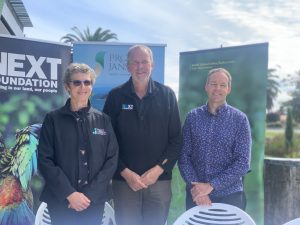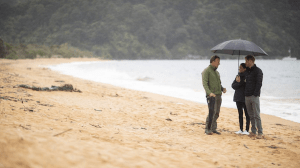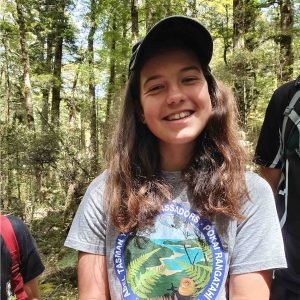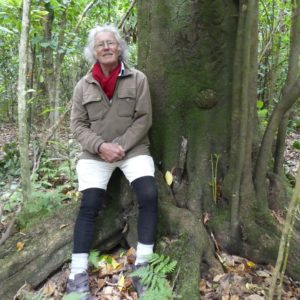
Gillian Wratt, Chair of Project Janszoon, Bill Kermode, CE Next Foundation and Martin Rodd, Partnerships Director. DOC, at the signing of the historic Tomorrow Accord Agreement for Wilding Pines.
A community-led project to rid priority areas of Abel Tasman National Park of wilding conifers had a boost on Friday 25 March 2022 as it was handed over to the Department of Conservation (DOC) to ensure invasive conifers do not re-establish.
Over the last 10 years a significant investment of time and money by the Abel Tasman Birdsong Trust, Project Janszoon, DOC, tourism operators, contractors and volunteers has seen all major stands of wilding conifers in priority areas controlled and the first round of seedling control undertaken.
With this target met, the NEXT Foundation, DOC and Project Janszoon have signed an historic handover agreement under the Tomorrow Accord in which DOC agrees to maintain the gains achieved through this initiative. The Tomorrow Accord was established in 2014 between the Crown and the NEXT Foundation, to ensure ecological transformations are protected for future generations. Through the Accord, the Crown agrees to maintain the ecological gains achieved by qualifying projects when restoration project targets are reached. The wilding conifer control handover to DOC marks the first of these targets to be met by Project Janszoon and its partners.
Bill Kermode, Chair and CEO of the NEXT Foundation, Mike Slater, Deputy-Director General Operations, Department of Conservation, and Gillian Wratt, Board Chair, Project Janszoon signed the agreement at a gathering in Nelson, on Friday 25 March. The signing takes place as Project Janszoon celebrates its 10th year of operations. A second agreement for coastal weed control was also signed.
Project Janszoon was launched in 2012 by the philanthropists Neal and Annette Plowman to transform the ecological prospects of the park. Project Janszoon provided the investment and expertise to accelerate wilding conifer control work which had been started by the Abel Tasman Birdsong Trust – a local conservation group formed in 2007 to bring the birds back to the Abel Tasman National Park. At their peak, wilding conifers infested 10,000 ha (almost 50%) of the park and risked impacting the iconic Separation Point granite ecosystem for which this park is renowned.
Project Janszoon Board Chair Gillian Wratt said that the Tomorrow Accord gives everyone involved in the project the security of knowing progress made would remain for future generations.
“What started as a community initiative to bring the birds back to the Abel Tasman has also resulted in a major restoration achievement that can be seen on the skyline of the park.
“Since 2014 Project Janszoon, DOC, the Abel Tasman Birdsong Trust and its volunteers have together invested time, effort and funding into this keystone project and seen it through to a successful outcome.
“The Tomorrow Accord is a fantastic way of future proofing the gains made so they will continue to contribute to the park over the long term, and a fitting milestone to mark Project Janszoon’s 10th year.
DOC Deputy-Director General Operations Mike Slater said DOC welcomed the significant biodiversity gains being made in Abel Tasman National Park by Project Janszoon working with the Abel Tasman Birdsong Trust, iwi, DOC and the community.
“Removal of wilding conifers from priority areas of the park has been a remarkable achievement that helps secure the healthy functioning of park ecosystems. DOC is pleased to continue to maintain this ecological gain by taking on the ongoing task of surveillance for re-invading conifers and removing seedlings as they establish.
“Our Tomorrow Accord agreement with the NEXT Foundation valuably demonstrates how philanthropic investment can accelerate achievement of significant biodiversity outcomes while substantially reducing the costs of maintaining the gains into the future.
Bill Kermode, CE of the NEXT Foundation, said the signing is a major milestone for Project Janszoon, and for the Tomorrow Accord . “It’s been made possible through the mahi of all the many people and organisations involved. NEXT would like to thank everyone who has contributed. It is also powerful affirmation that well-structured partnership between philanthropy and Government can deliver legacy outcomes for the country. It will benefit our land and our people – for future generations of New Zealand.”
Alistair Sheat, Chair of the Abel Tasman Birdsong Trust, said that it is great for the Park and its visitors to know that wilding pines will continue to be controlled.“Wilding pines have no place in the Abel Tasman National Park. The Abel Tasman Birdsong Trust recognised this in 2010. Key trustees with the help of R&D Environmental director Andrew Macalister raised over $600,000 through the NZ Lottery Grants Board to launch an audacious project to rid the Park of the invasive pines, that crowd out native trees and the food they provide for native birds.
“In 2014, Project Janszoon joined in partnership with the Abel Tasman Birdsong Trust to help accelerate the project and get to where it is now. The Abel Tasman Birdsong Trust looks forward to discussions with DOC on how the Trust might contribute to surveillance for re-invading conifers and removal of seedlings.”
With the wilding conifer targets met, Project Janszoon will re-focus its resources over the next five years on achieving further Tomorrow Accord targets. These include consolidating kākā, pāteke/brown teal and whio population establishment, continued weed and pest control, and restoration of coastal and forest ecosystems. Look out for Project Janszoon 10th anniversary events later in the year.



